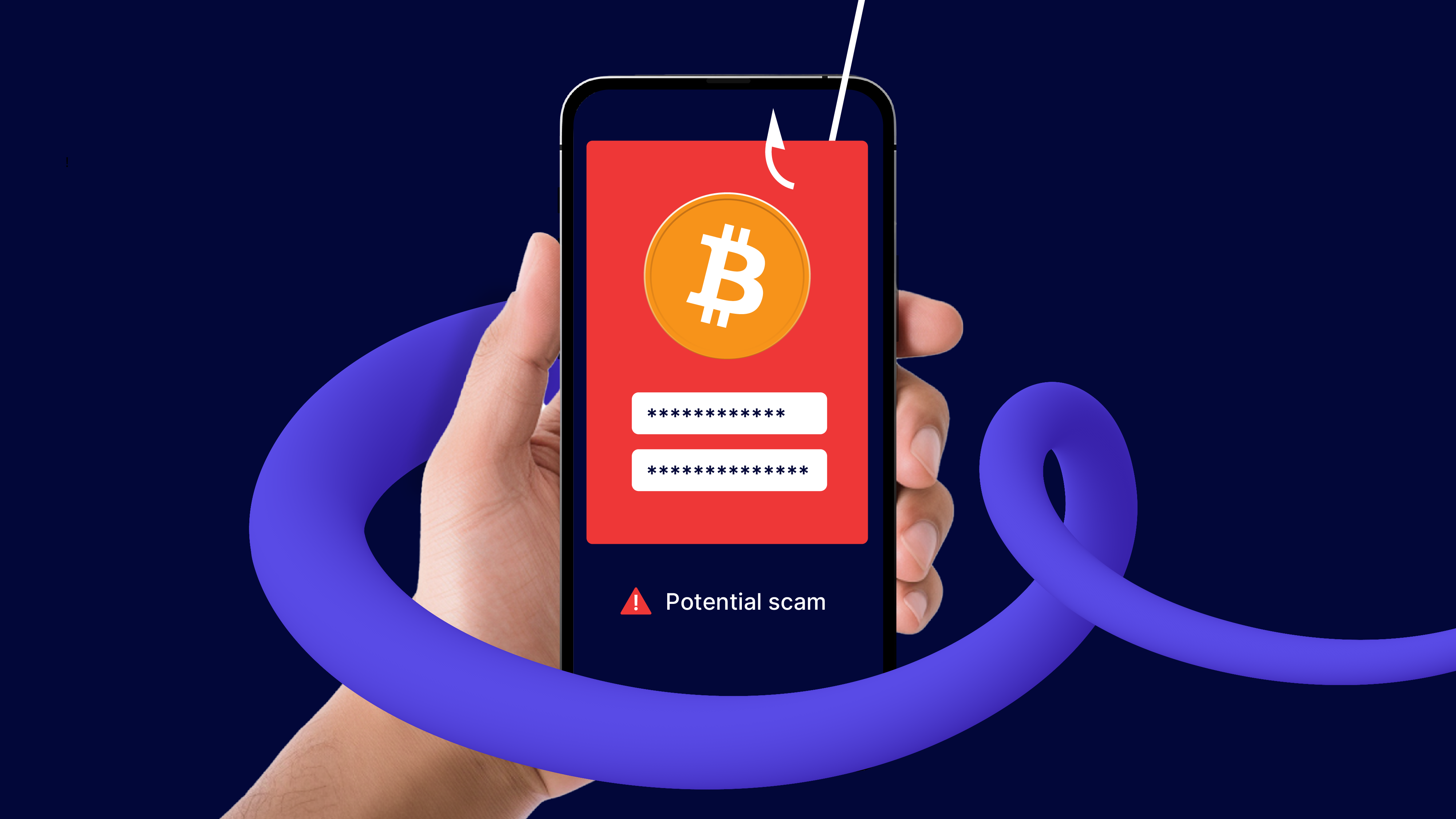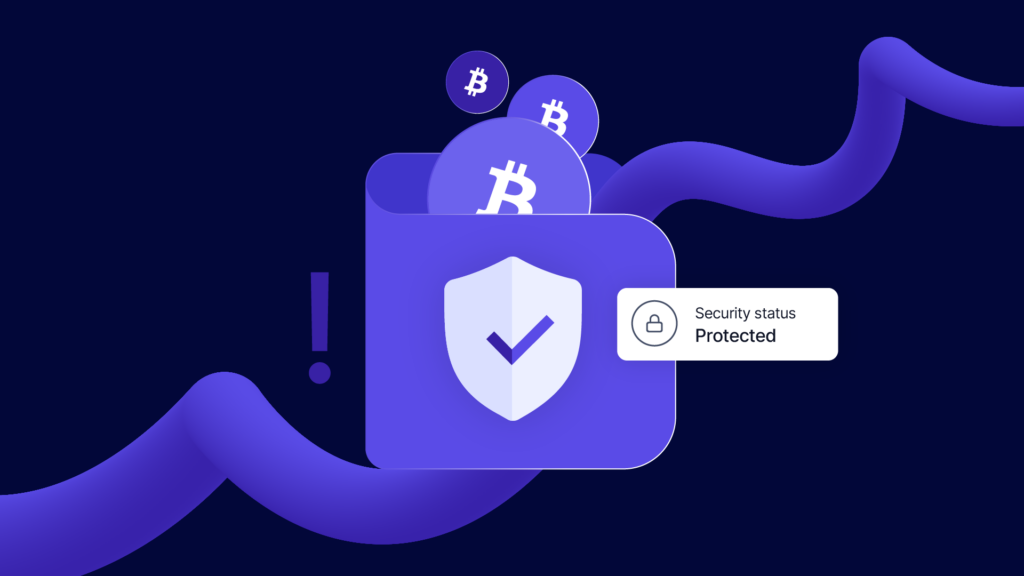
Accept crypto with CoinGate
Accept crypto with confidence using everything you need in one platform.
What Should Crypto Users Do to Stay Safe Online? 2025

The world of cryptocurrency is built on decentralization, privacy, and financial freedom. However, with these benefits comes a unique set of risks.
As cryptocurrencies rise in popularity and value, they attract not only enthusiastic investors but also cybercriminals eager to exploit the security gaps of unsuspecting users. From phishing scams and malware to fraudulent websites and malicious trackers, crypto users face numerous online threats every time they interact with the digital world.
Unlike traditional banking, where fraudulent transactions can often be reversed, the decentralized nature of cryptocurrency means that once your funds are transferred, they’re gone for good.
This makes security a top priority for anyone involved in crypto, whether you’re a casual user, a seasoned trader, or a business accepting crypto payments. Losing access to a wallet, exposing private keys, or accidentally sending crypto to a malicious address can result in irreversible financial loss.
Maximizing Online Safety: Key Pillars
The stakes are high, and cybercriminals are becoming increasingly sophisticated in their attacks. With crypto adoption growing rapidly, hackers are constantly refining their methods, targeting crypto exchanges, wallets, and even individual users.
The most common types of attacks include phishing schemes, malware designed to steal wallet keys, and fraudulent investment opportunities that seem too good to be true.
In this high-risk environment, protecting yourself requires more than just common sense—you need a robust set of digital tools designed to shield you from a wide range of cyber threats.
Each of the protective measures discussed below plays a crucial role in creating a safe online environment for crypto users. They don’t just protect against single attacks; they work in combination to provide a comprehensive defense system that addresses the complexity of modern-day cybercrime.
Security is not just for large exchanges or tech-savvy individuals. If you hold crypto assets, no matter how much, you are a target. Whether you are a frequent trader or someone who holds crypto long-term, adopting these security measures is critical for safeguarding your assets. Here’s how these eight key tools, from malware scanners to phishing protection, can help you stay safe in the ever-evolving world of crypto.
Malicious Domain Blocker to Prevent Access to Fraudulent Crypto Sites
Malicious domains are an ongoing threat. These are domains designed by cybercriminals to impersonate legitimate websites or host malware that can exploit vulnerabilities in your browser.
For example, crypto users could accidentally land on a malicious exchange site that looks identical to a trusted platform. After logging in, they might unknowingly hand over their credentials to hackers. A malicious domain blocker prevents this by flagging these dangerous sites before you can access them, ensuring you don’t mistakenly hand over personal or financial information.
Beyond crypto, malicious domains can also distribute ransomware, locking up your files (including access to crypto wallets) and demanding payment. A strong domain blocker can make this kind of attack less likely by limiting access to such malicious sites.
Phishing Domain Blocker for Defense Against Crypto Credential Theft
Phishing is one of the oldest tricks in the hacker’s book, but it’s still incredibly effective. In crypto, phishing attacks can be devastating. Hackers create convincing replicas of websites (like exchanges or wallet providers) to steal your login credentials or seed phrases.

Consider this: You receive an email that looks like it’s from your crypto exchange, asking you to log in due to “suspicious activity.” The link takes you to a site that looks exactly like the real thing, but it’s a fake. A phishing domain blocker protects you by detecting these fake URLs before you even load the site, saving you from costly mistakes.
Phishing attacks can also happen through social media, where users might receive fraudulent links posing as customer support. A phishing domain blocker adds an essential layer of protection against these deceptive tactics.
Ad Blocker to Stop Malvertising and Reduce Crypto Scam Exposure
While ads might seem harmless, some of them are designed to trick users into downloading malware or visiting dangerous websites. Known as “malvertising,” this tactic is particularly dangerous for crypto users who are targeted with fake investment opportunities, ICOs, or crypto wallet services.
Imagine seeing an ad for a crypto wallet that promises “free Bitcoin for new users.” Clicking on this ad could lead you to a scam website, designed to steal your funds or infect your device with malicious software. By using an ad blocker, you’re reducing exposure to these scams, ensuring your browsing environment is safer.
Additionally, many crypto trading or DeFi platforms have ads running on their interfaces. Even if the platforms themselves are secure, third-party ads might not be. An ad blocker helps keep unwanted interruptions out of your way.
Surfshark CleanWeb is one of those ad blockers that do the job.
Tracker Blocker to Maintain Privacy and Anonymity for Crypto Users
Trackers follow your online behavior, often for advertising purposes, but they can also collect valuable information that can be exploited by hackers. In the crypto world, where privacy is paramount, allowing websites to track your movements can put you at risk.
For example, if someone knows you frequently visit crypto exchanges or certain DeFi apps, they may attempt to profile you and target you for phishing or other attacks. A tracker blocker hides your activity, making it harder for malicious actors to identify or monitor you.
Additionally, trackers can expose your IP address, which is another risk for crypto users seeking anonymity. By using a tracker blocker, you can further obscure your online presence, which is critical when managing or transacting cryptocurrencies.
Malware Scanner to Detect Crypto-Specific Threats like Keyloggers and Clipboard Hijackers
Crypto malware is becoming more sophisticated, with tools like keyloggers and clipboard hijackers specifically targeting cryptocurrency users. These types of malware can track your keystrokes or change the wallet address you copy and paste, sending your funds to a hacker’s wallet instead.
For example, without a malware scanner, your system could be infected with a clipboard hijacker that swaps out your intended Bitcoin address for the attacker’s address. A simple mistake like this could cost you thousands. A good malware scanner detects and removes such threats before they can compromise your crypto transactions.
Also, crypto-mining malware is another concern. Cybercriminals can hijack your device’s processing power to mine cryptocurrencies without your knowledge, draining your system’s resources and potentially damaging your hardware. A reliable malware scanner prevents this by detecting and blocking these crypto-jacking attempts.
If you’re looking for a high-end malware scanner, we recommend Nord Threat Protection Pro.
Scam and Fraud Alerts for Quick Reaction to Emergency Situations
The crypto space is rife with scams and fraudulent schemes. From fake ICOs to Ponzi schemes, crypto users are prime targets for fraud. Scam and fraud alerts can help by flagging known bad actors and suspicious activities.
For example, you might be tempted to invest in a new token that promises massive returns, but a scam alert tool could notify you that this project has been flagged by the community as a fraud. Scam alerts are especially important in the fast-moving world of crypto, where it’s easy to get caught up in the hype of a new project without proper due diligence.
Moreover, these tools can warn you about phishing scams, fake giveaways on social media, and fraudulent exchanges, giving you an extra layer of security before you interact with unknown entities in the crypto world.
Malicious Website Blocker to Guard Against Hidden Crypto Malware and Phishing Attempts
Much like the malicious domain blocker, a malicious website blocker ensures that you don’t accidentally land on a harmful site. However, it goes beyond just domains—it scans the entire site for malicious content, such as fake login pages, hidden malware, or dangerous pop-ups.
Crypto users are often lured to malicious websites that promise free coins, airdrops, or investment opportunities. Without proper protection, it’s easy to fall victim. A malicious website blocker identifies these threats in real-time and blocks access before any harm is done.
Imagine you’re looking for a new wallet service and stumble upon a site that seems promising, but is actually a phishing scam. A malicious website blocker would immediately prevent you from interacting with this fraudulent page, potentially saving your crypto funds.
Anti-Phishing Protection to Safeguard Crypto Users from Sophisticated Phishing Campaigns
Phishing attacks continue to evolve, with hackers finding new ways to trick users. While phishing domain blockers target websites, anti-phishing protection takes a broader approach. It analyzes emails, social media messages, and links to detect suspicious activity.
For example, you might receive an email that appears to come from your hardware wallet provider, asking you to reset your password. Anti-phishing protection scans the email for red flags—like inconsistencies in the sender’s address or unusual requests—and alerts you to the threat.
Crypto users are also frequently targeted by fake customer support on social media platforms, offering help but ultimately trying to steal your private keys or personal information. Anti-phishing protection can flag these interactions, ensuring you don’t fall into the trap of providing sensitive information to scammers.
Here are some more tips on how to protect your cryptocurrency holdings from the biggest dangers.
Solution – A Multi-Layered Approach to Crypto Security
When it comes to protecting your crypto assets, there’s no single solution. Cyber threats come in many forms, and crypto users are often targeted because of the high value and irreversible nature of crypto transactions. Each of these eight protective measures plays a crucial role in maintaining a secure online environment:
- Malicious domain and website blockers stop you from interacting with harmful sites.
- Phishing domain blockers and anti-phishing tools protect your login credentials and sensitive information.
- Ad and tracker blockers enhance privacy and reduce exposure to dangerous content.
- Malware scanners actively detect threats, including those targeting crypto transactions.
- Scam and fraud alerts keep you informed about emerging threats in the crypto space.
By implementing all these security measures with tools like Nord Threat Protection Pro and Surfshark CleanWeb, you create a comprehensive defense system that shields you from various online threats.
Where transactions can’t be reversed and funds can be lost forever, taking these precautions is not just a recommendation—it’s a necessity. Protect your assets, your privacy, and your peace of mind by staying one step ahead of cybercriminals.
Accept crypto with CoinGate
Accept crypto with confidence using everything you need in one platform.

